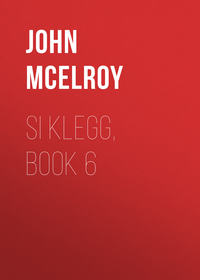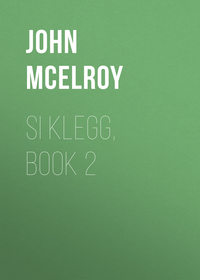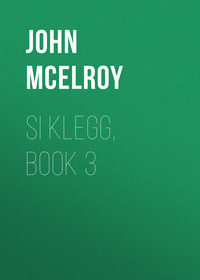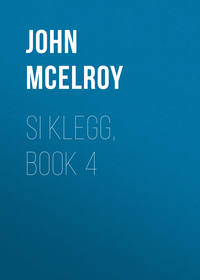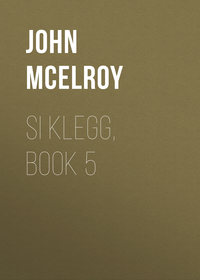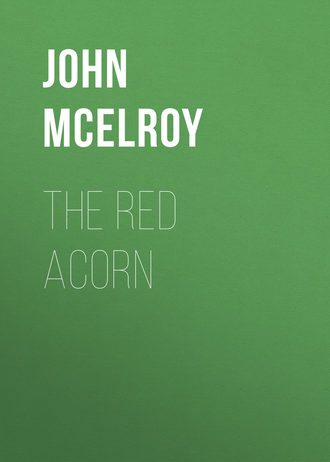 полная версия
полная версияThe Red Acorn

John McElroy
The Red Acorn
Preface
The name given this story is that made glorious by the valor and achievements of the splendid First Division of the Fourteenth Army Corps, the cognizance of which was a crimson acorn, worn on the breasts of its gallant soldiers, and borne upon their battle flags. There are few gatherings of men into which one can go to-day without finding some one wearing, as his most cherished ornament, a red acorn, frequently wrought in gold and studded with precious stones, and which tells that its wearer is a veteran of Mill Springs, Perryville, Shiloh, Corinth, Stone River, Chickamauga, Mission Ridge, Atlanta, Jonesville, March to the Sea, and Bentonville.
The Fourteenth Corps was the heart of the grand old Army of the Cumberland—an army that never knew defeat. Its nucleus was a few scattered regiments in Eastern Kentucky, in 1861, which had the good fortune to be commanded by Gen. George H. Thomas. With them he won the first real victory that blessed our arms. It grew as he grew, and under his superb leadership it was shaped and welded and tempered into one of the mightiest military weapons the world ever saw. With it Thomas wrung victory from defeat on the bloody fields of Stone River and Chickamauga; with it he dealt the final crushing blow of the Atlanta campaign, and with it defeat was again turned to victory at Bentonville.
The characters introduced into the story all belonged to or co-operated with the First Division of the Fourteenth Corps. The Corps’ badge was the Acorn. As was the custom in the army, the divisions in each Corps were distinguished by the color of the badges—the First’s being red, the Second’s white, and the Third’s blue. There was a time when this explanation was hardly necessary, but now eighteen years have elapsed since the Acorn flags fluttered victoriously over the last field of battle, and a generation has grown up to which they are but a tradition.
J. M.Chapter I. A Declaration
“O, what is so rare as a day in June? Then, if ever, come perfect days; Then Heaven tries the Earth if it be in tune, And over it softly her warm ear lays.”—Lowell.Of all human teachers they were the grandest who gave us the New Testament, and made it a textbook for Man in every age. Transcendent benefactors of the race, they opened in it a never-failing well-spring of the sweet waters of Consolation and Hope, which have flowed over, fertilized, and made blossom as a rose the twenty-century wide desert of the ills of human existence.
But they were not poets, as most of the authors of the Old Testament were.
They were too much in earnest in their great work of carrying the glad evangel of Redemption to all the earth—they so burned with eagerness to pour their joyful tidings into every ear, that they recked little of the FORM in which the saving intelligence was conveyed.
Had they been poets would they have conceived Heaven as a place with foundations of jasper, sapphires and emeralds, gates of pearl, and streets of burnished gold that shone like glass? Never.
That showed them to be practical men, of a Semitic cast of mind, who addressed hearers that agreed with them in regarding gold and precious stones as the finest things of which the heart could dream.
Had they been such lovers of God’s handiwork in Nature as the Greek religious teachers—who were also poets—they would have painted us a Heaven vaulted by the breath of opening flowers, and made musical by the sweet songs of birds in the first rapture of finding their young mates.
In other words they would have given us a picture of earth on a perfect June day.
On the afternoon of such a day as this Rachel Bond sat beneath an apple-tree at the crest of a moderate hill, and looked dreamily away to where, beyond the village of Sardis at the foot of the hill, the Miami River marked the beautiful valley like a silver ribbon carelessly flung upon a web of green velvet. Rather she seemed to be looking there, for the light that usually shown outward in those luminous eyes was turned inward. The little volume of poems had dropped unheeded from the white hand. It had done its office: the passion of its lines had keyed her thoughts to a harmony that suffused her whole being, until all seemed as naturally a part of the glorious day as the fleecy clouds in the sapphire sky, the cheerful hum of the bees, and the apple-blossoms’ luxurious scent.
Her love—and, quite as much, her girlish ambition—had been crowned with violets and bays some weeks before, when the fever-heat of patriotism seemed to bring another passion in Harry Glen’s bosom to the eruptive point, and there came the long-waited-for avowal of his love, which was made on the evening before his company departed to respond to the call for troops which followed the fall of Fort Sumter.
Does it seem harsh to say that she had sought to bring about this DENOUEMENT? Rather, it seems that her efforts were commendable. She was a young woman of marriageable age. She believed her her mission in life was marriage to some man who would make her a good husband, and whom she would in turn love, honor, and strive to make happy. Harry Glen’s family was the equal of her’s in social station, and a little above it in wealth to this he added educational and personal advantages that made him the most desirable match in Sardis. Starting with the premises given above, her first conclusion was the natural one that she should marry the best man available, and the next that that man was Harry Glen.
Her efforts had been bounded by the strictest code of maidenly ethics, and so artistically developed that the only persons who penetrated their skillful veiling, and detected her as a “designing creature,” were two or three maiden friends, whose maneuvers toward the same objective were brought to naught by her success.
It must be admitted that refining causists may find room for censure in this making Ambition the advance guard to spy out the ground that Love is to occupy. But, after all, is there not a great deal of mistake about the way that true love begins? If we had the data before us we should be pained by the enlightenment that, in the vast majority of cases the regard of young people for each other is fixed in the first instance by motives that will bear quite as little scrutiny as Miss Rachel Bond’s.
We can afford to be careless how the germ of love is planted. The main thing is how it is watered and tended, and brought to a lasting and beautiful growth. Rachel’s ambition gratified, there had been a steady rise toward flood in the tide of her affections. She was not long in growing to love Harry with all the intensity of a really ardent nature.
After the meeting at which Harry had signed the recruiting roll, he had taken her home up the long, sloping hill, through moonlight as soft, as inspiring, as glorifying as that which had melted even the frosty Goddess of Maidenhood, so that she stooped from her heavenly unapproachableness, and kissed the handsome Endymion as he slept.
Though little and that commonplace was said as they walked, subtle womanly instinct prepared Rachel’s mind for what was coming, and her grasp upon Harry’s arm assumed a new feeling that hurried him on to the crisis.
They stopped beneath the old apple-tree, at the crest of the hill, and in front of the house. Its gnarled and twisted limbs had been but freshly clothed in a suit of fragrant green leaves.
The ruddy bonfires, lighted for the war-meeting, still burned in the village below. The hum of supplementary speeches to the excited crowds that still lingered about came to their ears, mingled with cheers from throat rapidly growing hoarse, and the throb and wail of fife and drum. Then, uplifted on the voices of hundreds who sang it as only men, and men swayed by powerful emotions can, rose the ever-glorious “Star-Spangled Banner,” loftiest and most inspiring of national hymns. Through its long, forceful measures, which have the sweep and ring of marching battalions, swung the singers, with a passionate earnestness that made every note and word glow with meaning. The swelling paean told of the heroism and sacrifice with which the foundations of the Nation were laid, of the glory to which the land had risen, and then its mood changing to one of direness and wrath, it foretold the just punishment of those who broke the peace of a happy land.
The mood of the Sardis people was that patriotic exaltation which reigned in every city and village of the North on that memorable night of April, 1861.
But Rachel and Harry had left far behind them this passion of the multitude, which had set their own to throbbing, even as the roar of a cannon will waken the vibrations of harp-strings. Around where they stood was the peace of the night and sleep. The perfume of violets and hyacinths, and of myriads of opening buds seemed shed by the moon with her silvery rays through the soft, dewy air; a few nocturnal insects droned hither and thither, and “drowsy tinklings lulled the distant folds.”
As their steps were arrested Rachel released her grasp from Harry’s arm, but he caught her hand before it fell to her side, and held it fast. She turned her face frankly toward him, and he looked down with anxious eyes upon the broad white forehead, framed in silken black hair, upon great eyes, flaming with a meaning that he feared to interpret, upon the eloquent lines about the mobile, sensitive mouth, all now lifted into almost supernatural beauty by the moonlight’s spiritualizing magic.
What he said he could never afterward recall. His first memory was that of a pause in his speech, when he saw the ripe, red lips turned toward him with a gesture of the proud head that was both an assent and invitation. The kiss that he pressed there thrilled him with the intoxication of unexpectedly rewarded love, and Rachel with the gladness of triumph.
What they afterward said was as incoherent as the conversations of those rapturous moments ever are.
“You know we leave in the morning?” he said, when at last it became necessary for him to go.
“Yes,” she answered calmly. “And perhaps it is better that it should be so—that we be apart for a little while to consider this new-found happiness and understand it. I shall be sustained with the thought that in giving you to the country I have given more than any one else. I know that you will do something that will make me still prouder of you, and my presentiments, which never fail me, assure me that you will return to me safely.”
His face showed a little disappointment with the answer.
She reached above her head, and breaking off a bud handed it to him, saying in the words of Juliet:
“Sweet, good-night: This bud of love, by Summer’s ripening breath, May prove a beauteous flower, when next we meet.”He kissed the bud, and put it in his bosom; kissed her again passionately, and descended the hill to prepare for his departure in the morning.
She was with the rest of the village at the depot to bid the company good-bye, and was amazed to find how far the process of developing the bud into the flower had gone in her heart since parting with her lover. Her previous partiality and admiration for him appeared now very tame and colorless, beside the emotions that stirred her at the sight of him marching with erect grace at the head of his company. But while all about her were tears and sobs, and modest girls revealing unsuspecting attachments in the agitation of parting, her eyes were undimmed. She was proud and serene, a heightening of the color in her cheeks being the only sign of unusual feeling. Harry came to her for a moment, held her hand tightly in his, took the bud from his bosom, touched it significantly with his lips, and sprang upon the train which was beginning to move away.
The days that followed were halcyon for her. While the other women of Sardis, whose loved ones were gone, were bewailing the dangers they would encounter, her proud spirit only contemplated the chances that Harry would have for winning fame. Battles meant bright laurels for him in which she would have a rightful share.
Her mental food became the poetry of love, chivalry and glorious war. The lyric had a vivid personal interest. Tales of romantic daring and achievement were suggestions of possibilities in Harry’s career. Her waking hours were mainly spent, book in hand, under the old apple-tree that daily grew dearer to her.
The exalted mood in which we found her was broken in upon by the sound of some one shutting the gate below very emphatically. Looking down she saw her father approaching with such visible signs in face and demeanor of strong excitement that she arose and went to him.
“Why, father, what can be the matter?” she said, stopping in front of him, with the open book pressed to her breast.
“Matter enough, I’m afraid, Rachel. There’s been a battle near a place called Rich Mountain, in Western Virginia, and Harry Glen’s–”
“O, father,” she said, growing very white, “Harry’s killed.”
“No; not killed.” The old man’s lip curled with scorn. “It’s worse. He seems to’ve suddenly discovered he wasn’t prepared to die; he didn’t want to rush all at once into the presence of his Maker. Mebbe he didn’t think it’d be good manners. You know he was always stronger on etikwet than anything else. In short, he’s showed the white feather. A dozen or more letters have come from the boys telling all about it, and the town’s talking of nothing else. There’s one of the letters. It’s from Jake Alspaugh, who quite working for me to enlist. Read it yourself.”
The old gentleman threw the letter upon the grass, and strode on angrily into the house. Rachel smoothed out the crumpled sheet, and read with a growing sickness at heart:
Mr. Bond—Deer Sur:
i taik my pen in hand to lett you no that with the exception of an occashunal tuch of roomaticks, an boonions all over my fete from hard marchin, ime all rite, an i hope you ar injoin the saim blessin. Weve jest had an awful big fite, and the way we warmed it to the secshers jest beat the jews. i doant expect theyve stopt runnin yit. All the Sardis boys done bully except Lieutenant Harry Glen. The smell of burnt powder seamed to onsettle his narves. He tuk powerful sick all at wunst, jest as the trail was gittin rather fresh, and he lay groanin wen the rest of the company marched off into the fite. He doant find the klime-it here as healthy as it is in Sardis. i ‘stinguished myself and have bin promoted, and ive got a Rebel gun for you with a bore big enuff to put a walnut in, and it’ll jest nock your hole darned shoulder off every time you shoot it. No more yours til deth send me some finecut tobacker for heavens sake.
Jacob Alspaugh.
Rachel tore the letter into a thousand fragments, and flung the volume of poems into the ditch below. She hastened to her room, and no one saw her again until the next morning, when she came down dressed in somber black, her face pale, and her colorless lips tightly compressed.
Chapter II. First Shots
“Cowards fear to die; but courage stout, Rather than live in snuff, will be put out.”—Sir Walter Raleigh, on “The Snuff of a Candle.”All military courage of any value is the offspring of pride and will. The existence of what is called “natural courage” may well be doubted. What is frequently mistaken for it is either perfect self-command, or a stolid indifference, arising from dull-brained inability to comprehend what really is danger.
The first instincts of man teach him to shun all sources of harm, and if his senses are sufficiently acute to perceive danger, his natural disposition is to avoid encountering it. This disposition can only be overcome by the exercise of the power of pride and will—pride to aspire to the accomplishment of certain things, even though risk attend, and will to carry out those aspirations.
Harry Glen was apparently not deficient in either pride or will. The close observer, however, seemed to see as his mastering sentiment a certain starile selfishness, not uncommon among the youths of his training and position in the slow-living, hum-drum country towns of Ohio. The only son of a weakly-fondling mother and a father too earnestly treading the narrow path of early diligences and small savings by which a man becomes the richest in his village, to pay any attention to him, Harry grew up a self-indulgent, self-sufficient boy. His course at the seminary and college naturally developed this into a snobbish assumption that he was of finer clay than the commonality, and in some way selected by fortune for her finer displays and luxurious purposes. I have termed this a “sterile selfishness,” to distinguish it from that grand egoism which in large minds is fruitful of high accomplishments and great deeds, and to denote a force which, in the sons of the average “rich” men of the county seats, is apt to expend itself in satisfaction at having finer clothes and faster horses and pleasanter homes, than the average—in a pride of white hands and a scorn of drudgery.
When Harry signed his name upon the recruiting roll—largely impelled thereto by the delicately-flattering suggestion that he should lead off for the youth of Sardis—he had not the slightest misgiving that by so doing he would subject himself to any of the ills and discomforts incidental to carrying out the enterprise upon which they were embarking. He, like every one else, had no very clear idea of what the company would be called upon to do or undergo; but no doubt obtruded itself into his mind that whatever might be disagreeable in it would fall to some one else’s lot, and he continue to have the same pleasant exemption that had been his good fortune so far through life.
And though the company was unexpectedly ordered to the field in the rugged mountains of Western Virginia, instead of to pleasant quarters about Washington, there was nothing to shake this comfortable belief. The slack discipline of the first three months’ service, and the confusion of ideas that prevailed in the beginning of the war as to military duties and responsibilities, enabled him to spend all the time he chose away from his company and with congenial spirits, about headquarters, and to make of the expedition, so far as he was concerned, a pleasant picnic. Occasionally little shadows were thrown by the sight of corpses brought in, with ugly-looking bullet holes in head or breast, but these were always of the class he looked down upon, and he connected their bad luck in some way with their condition in life. Doubtless some one had to go where there was danger of being shot, as some one had to dig ditches and help to pry wagons out of the mud, but there was something rather preposterous in the thought that anything of this kind was incumbent upon him.
The mutterings of the men against an officer, who would not share their hardships and duties, did not reach his ears, nor yet the gibes of the more earnest of the officers at the “young headquarter swells,” whose interest and zeal were nothing to what they would have taken in a fishing excursion.
It came about very naturally and very soon that this continual avoidance of duty in directions where danger might be encountered was stigmatized by the harsher name of cowardice. Neither did this come to his knowledge, and he was consequently ignorant that he had delivered a fatal stab to his reputation one fine morning when, the regiment being ordered out with three days’ rations and forty rounds of cartridges, the sergeant who was sent in search of him returned and reported that he was sick in his tent. Jacob Alspaugh expressed the conclusion instantly arrived at by every one in the regiment:
“It’s all you could expect of one of them kid-glove fellers, to weaken when it came to serious business.”
Harry’s self-sufficiency had left so little room for anything that did not directly concern his own comfort, that he could not understand the deadly earnestness of the men he saw file out of camp, or that there was any urgent call for him to join them in their undertaking.
“Bob Bennett’s always going where there’s no need of it,” he said to a companion, as he saw the last of the regiment disappear into the woods on the mountain side. “He could have staid back here with us just as well as not, instead of trudging off through the heat over these devilish roads, and probably get into a scrape for which no one will thank him.”
“Yes,” said Ned Burnleigh, with his affected drawl, “what the devil’s the use, I’d like to know, for a fellah’s putting himself out to do things, when there’s any quantity of other fellahs, that can’t be better employed, ready and even anxious to do them.”
“That’s so. But it’s getting awful hot here. Let’s go over to the shade, where we were yesterday, and have Dick bring us a bucket of cold spring water and the bottles and things.”
“Abe!” said Jake Alspaugh to his file-leader—a red-headed, pock-marked man, whose normal condition was that of outspoken disgust at every thing—“this means a fight.”
“Your news would’ve been fresh and interesting last night,” growled Abe Bolton. “I suppose that’s what we brought our guns along for.”
“Yes; but somebody’s likely to get killed.”
“Well, you nor me don’t have to pay their life insurance, as I know on.”
“But it may be you or me.”
“The devil’d be might anxious for green wood before he’d call you in.”
“Come, now, don’t talk that way. This is a mighty serious time.”
“I’ll make it a durned sight seriouser for you if you don’t keep them splay feet o’your’n offen my heels when we’re marching.”
“Don’t you think we’d better pay, or—something?”
“You might try taking up a collection.”
“Try starting a hymn, Jake,” said a slender young man at his right elbow, whose face showed a color more intimately connected with the contents of his canteen than the heat of the day. “Line it out, and we’ll all join in. Something like this, for example:
‘Hark, from the tombs a doleful sound Mine ears attend the cry. Ye living men, come view the ground Where you must shortly lie.’”Alspaugh shuddered visibly.
“Come, spunk up, Jake,” continued the slender young man. “Think how proud all your relations will be of you, if you die for your country.”
“I’m mad at all of my relations, and I don’t want to do nothing to please ‘em,” sighed Jake.
“But I hope you’re not so greedy as to want to live always?” said the slender young man, who answered roll-call to Kent Edwards.
“No, but I don’t want to be knocked off like a green apple, before I’m ripe and ready.”
“Better be knocked off green and unripe,” said Kent, his railing mood changing to one of sad introspection, “than to prematurely fall, from a worm gnawing at your heart.”
Jake’s fright was not so great as to make him forego the opportunity for a brutal retort:
“You mean the ‘worm of the still,’ I s’pose. Well, it don’t gnaw at my heart so much as at some other folkses’ that I know’d.”
Kent’s face crimsoned still deeper, and he half raised his musket, as if to strike him, but at that moment came the order to march, and the regiment moved forward.
The enemy was by this time known to be near, and the men marched in that silence that comes from tense expectation.
The day was intensely hot, and the stagnant, sultry air was perfumed with the thousand sweet odors that rise in the West Virginia forests in the first flush of Summer.
The road wound around the steep mountain side, through great thickets of glossy-leaved laurel, by banks of fragrant honeysuckle, by beds of millions of sweet-breathing, velvety pansies, nestling under huge shadowy rocks, by acres of white puccoon flowers, each as lovely as the lily that grows by cool Siloam’s shady rill—all scattered there with Nature’s reckless profusion, where no eye saw them from year to year save those of the infrequent hunter, those of the thousands of gaily-plumaged birds that sang and screamed through the branches of the trees above, and those of the hideous rattlesnakes that crawled and hissed in the crevices of the shelving rocks.
At last the regiment halted under the grateful shadows of the broad-topped oaks and chestnuts. A patriarchal pheasant, drumming on a log near by some uxorious communication to his brooding mate, distended his round eyes in amazement at the strange irruption of men and horses, and then whirred away in a transport of fear. A crimson crested woodpecker ceased his ominous tapping, and flew boldly to a neighboring branch, where he could inspect the new arrival to good advantage and determine his character.


